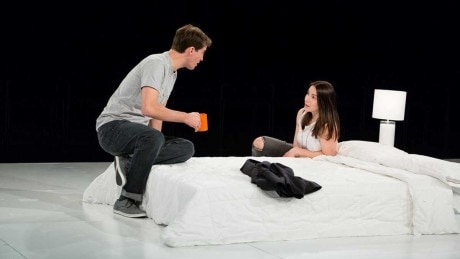The head and the heart endeavor to coexist in the Wilma Theater’s latest production of Tom Stoppard’s newest work, The Hard Problem. Rich with provocative questions and challenging to the notions of how we think our brains function, the production delivers a new take on where emotion figures into the complicated brain equation.

The Hard Problem is Stoppard’s first work since Rock ‘n’ Roll, and part of a long-standing history with the Wilma Theater, who has a reputation for presenting his work. He aptly takes on more than one hard problem here by illustrating the struggles of Hillary (Sarah Gliko), a young psychology student professionally toying with the conundrums of the brain in the form of consciousness versus grey matter, while attempting to find her own way in a few complicated personal matters. In a singular act, Stoppard lays out one argument after another, most often clashing science and philosophy and, in some small way, God. Familiar with creating plays about intellectuals for intellectuals, Stoppard has a language style built particularly well for the contemporary issues in The Hard Problem, which he uses to weave a net of ethical problems that ground the characters in real-life stakes while surrounded by tricky technical lingo.
Where Director and Artistic Director Blanka Zizka really hooks into this script is in the clinical feeling of what these conversations look like coming to life. Staged in an alley setting with the audience positioned on both sides of the action, the second the curtain is drawn I had distinct feelings of both observing and being observed. Not only did the orientation give me an intimate relationship to an already intimate play, but the physical manifestation of “point of view” is never far from consciousness as the events unfold.
As one of the Wilma Theater’s great strengths, the visual story contributes a large portion of what’s fascinating about the production. Matt Saunders’ stark white set creates an environment that flexes and forms to what the multiple locations require. Although the time spent in changing scenery feels excessive by the end, it is a treat to watch the nimble crew work as a tightly choreographed team.
Thom Weaver’s lighting design dazzles doing as much work to create each distinct location as the space itself. What completes the world more than any other element is Vasilija Zivanic’s costume design. The tight color palette and unique styling choices so clearly define each character while keeping with the high elegance of the production. Composer and Sound Designer Daniel Perelstein creatively ties the scenes together with a score performed live by musician Michael Pedicin, who saunters through the pauses in the action with sly, intriguing saxophone solos.
While the environment sustains the mood throughout, what Zizka may miss is every peak and valley of what Stoppard delivers in his plot and characters. A moment such as a supremely awkward dinner party has largely the same tone as the casual office meeting seen just a few minutes prior. Or what could be the bubbly back and forth of a bedroom scene squabble has a heaviness to it that unnecessarily blends it into the workplace drama. This contributes to a sense of monotony, especially in an evening packed with intense theoretical discussion and no chance to catch up during intermission.

Sarah Gliko’s Hilary has plenty of sincerity and verve, able to unapologetically take her place in any room she enters. Jeena Yi (Bo) and Gaby Bradbury (Cathy) both bring a lightness to any scene they appear in, and Steven Rishard’s undeniable charisma as Jerry is always a breath of fresh air.
While this production of Stoppard’s play has a distinct hum and buzz, and few missed notes, there are moments that could potentially have more of a pop and sizzle. Much like the strolling saxophonist himself, The Hard Problem’s cast ably slides their fingers over the keys of this piece, making the evening visually rewarding and mentally stimulating.
Running Time: One hour and fifty minutes, with no intermission.
The Hard Problem plays through February 6, 2016 at the Wilma Theater – 265 South Broad Street, in Philadelphia, PA. For tickets, call the box office at (215) 546-7824, or purchase them online.




